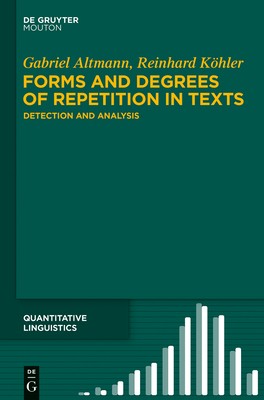
- We will send in 10–14 business days.
- Author: Gabriel Altmann
- Publisher: Walter de Gruyter
- ISBN-10: 3110411792
- ISBN-13: 9783110411799
- Format: 15.6 x 23.4 x 1.6 cm, hardcover
- Language: English
- SAVE -10% with code: EXTRA
Reviews
Description
The present volume presents objective methods to detect and analyse various forms of repetitions. Repetition of textual elements is more than a superficial phenomenon. It may even be considered as constitutive for units and relations in a text: on a primary level when no other way exists to establish a unit - as in a musical composition (a motif can be recognised as such only after at least one repetition) - and on a secondary, artistic level, where repetition is a consequence of the transfer of the equivalence principle from the paradigmatic axis to the syntagmatic one as showed by R. Jakobson.
The analysis of repetitive elements and structures in texts with objective mathematical means can serve several practical and theoretical purposes, among them:
Characterisation of texts by means of parameters (measures, indicators) as taken from established mathematical statistics or specifically constructed ones in individual cases.
Comparison of texts on the basis of their quantitative characteristics and classification of the texts by the results.
Research for the laws of text, which control the mechanisms connected to text creation. As a remote aim, the construction of a theory of text consisting of a system of text laws. The final attempt of every possible quantitative text analysis is the construction of a text theory. The book illustrates this on examples of such laws and corresponding empirical tests.
EXTRA 10 % discount with code: EXTRA
The promotion ends in 10d.09:57:02
The discount code is valid when purchasing from 10 €. Discounts do not stack.
- Author: Gabriel Altmann
- Publisher: Walter de Gruyter
- ISBN-10: 3110411792
- ISBN-13: 9783110411799
- Format: 15.6 x 23.4 x 1.6 cm, hardcover
- Language: English English
The present volume presents objective methods to detect and analyse various forms of repetitions. Repetition of textual elements is more than a superficial phenomenon. It may even be considered as constitutive for units and relations in a text: on a primary level when no other way exists to establish a unit - as in a musical composition (a motif can be recognised as such only after at least one repetition) - and on a secondary, artistic level, where repetition is a consequence of the transfer of the equivalence principle from the paradigmatic axis to the syntagmatic one as showed by R. Jakobson.
The analysis of repetitive elements and structures in texts with objective mathematical means can serve several practical and theoretical purposes, among them:
Characterisation of texts by means of parameters (measures, indicators) as taken from established mathematical statistics or specifically constructed ones in individual cases.
Comparison of texts on the basis of their quantitative characteristics and classification of the texts by the results.
Research for the laws of text, which control the mechanisms connected to text creation. As a remote aim, the construction of a theory of text consisting of a system of text laws. The final attempt of every possible quantitative text analysis is the construction of a text theory. The book illustrates this on examples of such laws and corresponding empirical tests.


Reviews